In June, we turned our focus to two groups who too often go unseen—underserved veterans in rural and minority communities, and those living with the effects of post-traumatic stress. Through storytelling, research, media outreach, and open polling, we continued our mission to elevate the voices of veterans, advocate for policy that meets their needs, and provide tools that support their well-being.
From local heroes rebuilding after disaster to national conversations about suicide prevention and access to care, we worked to ensure that no one who served is left behind.
Here’s what you might have missed:
Underserved Veterans and PTS Awareness in Focus
We shined a light on rural and minority veterans and their families, exploring the barriers they face and the work being done to close the gaps. From highlighting key facts about rural veteran populations to uplifting efforts like Operation Honor: Rural Salute, June’s features challenged us to pay closer attention to the communities that are often overlooked.
– Connecting Rural Veterans and Their Families Through Operation Honor: Rural Salute
– 6 Things You Might Not Know About Rural Veterans
– Veterans Are Speaking Clearly on the ACCESS Act. Congress Should Listen.
– The State of Veteran Post-Traumatic Stress
– How to Find Mental Health Care If You’re A Veteran – Even In A Rural Area
– 7 Everyday Ways to Support Veterans’ Mental Health
The Lasting Mission Podcast
In June, The Lasting Mission podcast wrapped up its two-part conversation on the opioid epidemic with Voices for Non-Opioid Choices. We also continued our coverage of veteran homelessness with Part 2 of Matthew Landis’ powerful story—from hitting rock bottom to rediscovering purpose and community.
Subscribe to The Lasting Mission on YouTube or your favorite podcast platform, and help us spread these critical conversations by sharing the podcast with others.
Mission Roll Call University (MRCU)
Our YouTube channel, Mission Roll Call University, continues to grow as a trusted resource for veterans and families. In June, we released a practical guide to locating VA facilities near you—an important step in connecting to care and support.
Watch, subscribe, and share to help us ensure veterans have access to the guidance and resources they need to thrive.
MRC Town Hall: Your Voice, Your Power
We hosted a live-streamed Veteran Town Hall, bringing together voices from across the country to talk about real veteran experiences and solutions. From policy gaps to personal stories, these conversations help guide our work—and remind us how powerful it is when veterans speak directly to one another and to leaders.
MRC in the Media: Real Stories, Real Impact
In June, our work was featured in national and local media outlets, amplifying veteran voices and advocating for smarter, more compassionate policy solutions. From thoughtful conversations around VA reform to spotlighting events like Hockey Heals 22, our media presence underscored our mission.
– Smart Budget Cuts at the VA Could Help Preserve Critical Services – The Hill
– 5th Annual Hockey 22 Event Raises Awareness for Veteran Suicide – FOX 13
– Veterans Play 22 Hours of Hockey for Suicide Awareness – NPR Affiliate
From the Blog: Stories That Matter
This month’s stories included a look at veteran-led disaster recovery efforts in the Palisades, a historical reflection on 250 years of military service, and a recap of a community hockey event that raises awareness for the veteran suicide crisis.
– Where the Flag Still Flies: Veterans Rebuild the Palisades
– Hockey Heals 22
– 250 Years of the Military
Speak Up: Participate in Our Open Polls
Your voice shapes our work. We’re actively gathering feedback on topics like VA care, suicide prevention, and rural veteran access. These surveys help us bring real-time concerns to lawmakers and leaders who can make a difference.
– Take Our Open Polls
– Participate in Our Veteran Suicide Survey
Looking Ahead: Independence Through Support and Access
In July, we’ll focus on veteran independence—honoring the strength and resilience of wounded veterans, caregivers, and those navigating life after service with courage and adaptability. We’ll explore how accessibility, autonomy, and practical support can help more veterans thrive on their own terms.
Stay tuned for new stories, new research, and new opportunities to connect.
If there is something we have learned about supporting our veterans, it is that mental health is one of the most complicated problems to tackle, especially for veterans in rural areas. VA reports have found that veterans are most vulnerable in the first three months following separation from military service, although suicide risk “remains elevated for years after the transition.” With this information, we can better support our veterans and their families to get them the assistance they need.
While veterans can access mental health care through a variety of channels, knowing what is available to them and gaining access are common hurdles for not just rural veterans but all veterans. Listed below are resources available to veterans looking for mental healthcare.
The two main mental health resources are the VA and the Veteran Crisis Line.
VA Mental Health Services
- VA mental health services are available to all veterans, regardless of their discharge status, and even if they don’t qualify for full VA benefits.
- The VA offers various mental health services, including individual and group therapy, medication management, and support groups.
- You can find a VA medical center or Vet Center near you through the VA.gov website.
Veterans Crisis Line (988, then press 1)
- This is a crucial resource for veterans experiencing a crisis or needing immediate support. It’s accessible 24/7, offering confidential counseling through phone, text, and online chat.
- If you or the veteran or service member in your life shows signs of crisis, contact the Veterans Crisis Line. In the United States, dial 988 then press 1 or text 838255.
- You can chat online with a VA responder from anywhere.
- If you are overseas, you can connect with the Veterans Crisis Line Chat. If you prefer a phone call, you can request this via chat. A crisis line responder will call the number you provide at no charge.
But if those are unavailable to you due to location or other reasons, here’s a list of other mental health resources you might not know about.
Boulder Crest is the home of Posttraumatic Growth (PTG). They offer life-changing programs free of charge to members of the military, veterans, and first responder communities, and their families.
America’s Warrior Partnership
America’s Warrior Partnership’s mission is to partner with communities to prevent veteran suicide. Their programs accomplish this by starting at the community level and understanding the unique situations of veterans and their families.
Avalon Action Alliance connects our nation’s veterans and first responders with life-changing programs. Their Alliance Partners offer a wide range of treatments, training and support tailored to the unique needs of our veterans and first responders.
Shields & Stripes provides a top-tier rehabilitation program for our military veterans and first responders.
Warrior Canine Connection utilizes a Mission Based Trauma Recovery model to help Warriors recovering from the stress of combat reconnect with their families, communities, and life. By interacting with the dogs as they move from puppyhood to training to adult service dogs, Warrior Trainers benefit from a physiological and psychological animal-human connection.
Wounded Warrior Project
Provides various mental health services, including individual and couples counseling, and PTSD and addiction treatment.
Military OneSource
Offers resources for veterans, including mental health information and a directory of services.
Mission Roll Call’s Veteran Resource Directory
Our comprehensive directory connects veterans and their families to organizations ready to help.
When it comes to the mental health of veterans and their families, we know there’s not one solution that fits all. But what we do know is that we need to be more proactive. Help exists for veterans and their families; they just need to know what is available to them. Share this article with a veteran – they might need it or know someone else who does.
Supporting a veteran’s mental health requires active listening, encouragement, and resourcefulness. It involves creating a safe space for them to share their feelings, finding local support groups or mental health professionals, and being patient and understanding. Small, everyday gestures like offering a helping hand with tasks, expressing empathy, and attending local veterans’ events can also make a significant difference.
Here are 7 everyday ways to support veterans’ mental health:
1. Be present and consistent. Let them know you care and are there for them, even if you don’t fully understand what they’re going through. Offer encouraging words and focus on their strengths and resilience.
2. Encourage without pushing. Acknowledge that recovery takes time, and don’t pressure them to “get better” quickly. Be patient and understanding as they navigate their journey. Allow the veteran to decide when and how they want to share their feelings. Offer space for them to share if they wish, but don’t pressure them.
3. Help navigate resources. Help them find resources like local support groups, mental health professionals, or the VA’s mental health services. Mission Roll Call and the Veterans Crisis Line can also provide valuable resources, information, and assistance. Knowing that there is a path to recovery with tailored resources is its own kind of reassurance.
4. Share space without judgment. Be a supportive listener, offering a non-judgmental space for the veteran to share their experiences and feelings. Give them your full attention and avoid offering unsolicited advice.
5. Offer practical help. Support them with everyday tasks like grocery shopping, meal planning, or errands if they are struggling to manage their routine.
6. Stay connected regularly. Staying connected with veterans in your life can provide a sense of purpose and community. If your veteran is hard to get a hold of, consider social media platforms or other online routes to keep the conversation going at their preferred speed. Also, small actions like attending veteran-specific events with them can go a long way to make them feel connected with you and other veterans.
7. Self-Care for you. Supporting someone with mental health challenges can be emotionally taxing. It’s important to prioritize your own well-being and seek support for yourself if needed. You cannot pour from an empty cup, and it is important for those who support our veterans to give them our best – to do this, you must take care of yourself.
By employing these strategies, both veterans and those who care about them can foster stronger connections and build supportive communities, ultimately leading to greater well-being and a sense of belonging. Supporting veterans is crucial. By providing support, we acknowledge their service, help them navigate the challenges they face, and ensure they can lead fulfilling lives.
Looking for more mental health information and resources? Discover the support you need in Mission Roll Call’s Veteran Resource Directory. Our comprehensive directory connects veterans and their families to organizations ready to help.
If you or a veteran in your life needs support, consider requesting help from the AWP Network. The AWP Network is staffed by a dedicated team of case coordinators with social services backgrounds who are experts at holistically identifying problems and finding one-size-fits-one solutions. For immediate support, call the Veterans Crisis Line – dial 988 then press 1.
Despite their service, rural veterans often face unique barriers to accessing the care and support they need after leaving the military. The first step toward supporting rural veterans is educating ourselves on the challenges they face.
Here are 6 Things You Might Not Know About Rural Veterans:
1. Rural veterans lack access to necessary healthcare
While there are 4.7 million veterans who live in rural areas, they each face their own unique barriers to accessing healthcare. Many rural veterans struggle to access necessary healthcare due to factors like geographic distance to VA facilities, transportation challenges, and limited internet access that hinders telehealth services.
2. Rural veterans face a higher risk of mental health challenges
Rural veterans are less likely to receive the mental health care they need compared to urban veterans. While mental health is a significant concern for all veterans and their families, due to their living environment, rural veterans are at a higher risk of mental health challenges like post-traumatic stress, depression, and anxiety.
3. Rural veterans are more likely to face economic disparities
Compared to their urban counterparts, rural veterans are more likely to have lower household incomes and experience higher rates of poverty, with more than half earning an annual income of less than $35,000. This can further compound their challenges in accessing essential resources like healthcare.
4. Rural veterans are in a position to have their well-being impacted by social isolation
The isolated nature of rural communities can lead to social isolation, impacting their mental health and overall well-being. Veterans die by suicide at 1.5 times the rate of their non‐veteran counterparts, with rural veterans at a 20%–22% greater risk of dying by suicide than urban veterans. Peer support and community engagement programs can help combat this, which leads us to our final point.
5. Rural veterans rely heavily on resources
The VA is a crucial resource to rural veterans, but they also rely heavily on community providers, veteran service organizations, and programs to meet their needs.
Mission Roll Call has identified and vetted many nonprofit organizations that work with these communities. For example, the Alaska Warrior Partnership™ (AKWP) is committed to improving veterans’ quality of life in the state of Alaska through the coordination of local services and opportunities. And Boulder Crest Foundation provides a free, first-class rural wellness retreat dedicated to helping America’s military members, veterans, and their families. For more resources and support, visit Mission Roll Call’s comprehensive Veteran Resource Directory.
6. Rural veterans are resilient, resourceful, and deeply connected to their communities
This isn’t just a list of challenges—rural veterans bring incredible strengths that deserve recognition. They embody grit, self-reliance, and a strong sense of duty, often serving as the backbone of their communities long after their time in uniform. With deep family roots and a commitment to service, they step up as mentors, leaders, and quiet helpers in times of need. These qualities not only make them vital to the fabric of rural America, but they also make them powerful voices in shaping the future of the broader veteran community.
Conclusion
Rural veterans make up an essential part of the American veteran population—yet too often, their stories are overlooked, and their needs go unmet. From barriers to healthcare and mental health services to economic hardship and geographic isolation, the challenges are real. But so is their strength.
As individuals, we can show support to rural veterans by educating ourselves on their unique needs and challenging harmful stereotypes or stigmas. We can also point veterans and their families to useful benefits, service organizations, social groups, and other resources.
To join us in advocating for rural veterans and ensuring their voices are heard, visit www.missionrollcall.org.
If you are a rural veteran, we want to hear from you through our open polls. Participating in our polls is crucial for Mission Roll Call’s advocacy efforts. Your input helps us understand the needs and concerns of the rural veteran community, guiding our actions and amplifying your voice in driving meaningful change.
On June 14, 1775, the Continental Congress took a bold step by establishing the Continental Army—more than a year before the Declaration of Independence was signed. That decision marked the beginning of what would become the most formidable military force in the world.
Two and a half centuries later, we honor the generations of Americans who have served, the battles they’ve endured, and the legacy they’ve built. The 250th anniversary of the United States military is more than a historical milestone. It’s a chance to reflect on the strength, resilience, and character of those who have worn the uniform, and the families who have stood beside them.
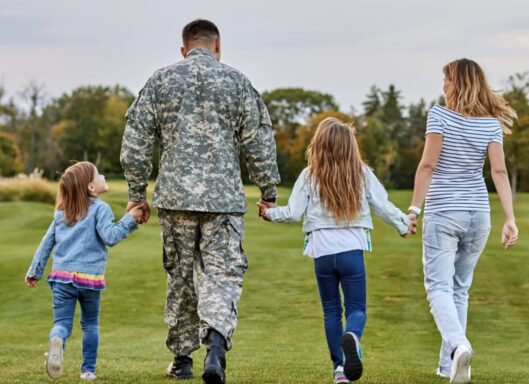
A Legacy of Innovation and Resolve
The U.S. military has always evolved to meet the challenges of its time. From the colonial militias of the 18th century to today’s high-tech operations across land, sea, air, space, and cyberspace, service members have shaped the course of history through innovation and determination.
Throughout those years, the military has given rise to technologies that changed civilian life as well. M&Ms were created during World War II to withstand combat conditions. Super Glue was discovered while searching for materials for clear plastic rifle sights. Even duct tape began as a military invention to seal ammunition boxes. These breakthroughs are just small examples of how military service has intersected with American ingenuity.
To explore more key moments in military history, visit our interactive timeline.
Honoring FiFi
This year also marks the 80th birthday of FiFi, one of only two remaining airworthy B-29 Superfortress bombers. Built near the end of World War II, FiFi has become a living piece of aviation history. She regularly appears at airshows and commemorations around the country, offering Americans a rare opportunity to witness the power and precision of this historic aircraft.

The B-29 program introduced innovations that transformed air combat, including pressurized cabins and remote-controlled turrets. Crews who flew these bombers faced long, dangerous missions over enemy territory, often without any guarantee of return. Pilots, gunners, engineers, and support staff worked in unison to carry out one of the most technically advanced missions of the war.
Today, FiFi reminds us of the courage of that generation and the importance of preserving history for those who follow.
The Heart Behind the Uniform
Military service is a deeply personal calling. People join for different reasons: a sense of duty, a family tradition, the desire to protect others, or the opportunity to grow through challenge. What unites them is a commitment to something greater than themselves.
That commitment is felt not only by the service members but also by the families who support them. Spouses keep households running during deployments. Children adapt to constant change. Parents wait for phone calls, letters, or homecomings. The military community is built on shared strength, quiet sacrifices, and enduring support.

Even after the uniform comes off, the experience of service continues to shape lives. Veterans carry the pride of service and, in many cases, the physical and emotional weight of their experiences. As a nation, we have a responsibility to ensure they receive the care, respect, and recognition they deserve.
The Cost—and the Promise—of Service
For every story of innovation or victory, there are also stories of loss, trauma, and hardship. Military service demands more than physical strength. It calls for courage under pressure, moral conviction in complex environments, and the ability to persevere through adversity.
At Mission Roll Call, we listen to veterans, amplify their voices, and advocate for solutions that reflect their real needs. Through real-time polling and outreach, we connect veterans and their families with decision-makers to influence positive change.
We’ve explored some of the challenges they face in our series of “State of” articles, including the State of Veterans, State of Veterans Mental Health, and the State of Military Families. These reports offer an honest, data-driven look at where we are—and where we must go to better support those who served and their families.
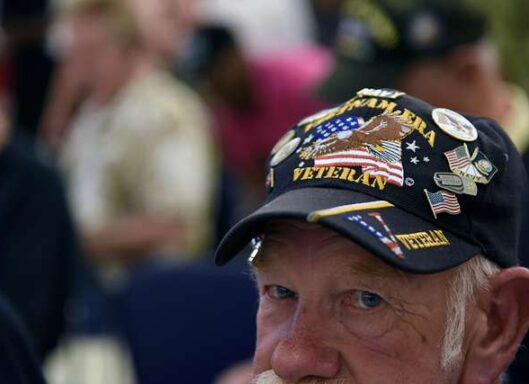
Looking Ahead
As we mark this 250-year anniversary, we do so with deep gratitude and clear purpose. Gratitude for those who stepped forward to serve. Purpose in our ongoing mission to support them.
The future of the U.S. military will be shaped by new challenges, emerging technologies, and the next generation of brave Americans. But the core values—duty, honor, service—remain the same. These values have carried us through war and peace, progress and pain, and they will continue to guide us in the years ahead.
We invite you to join us in honoring this historic milestone. Visit our military timeline to learn more about key moments across 250 years of service. Talk to a veteran. Attend a local ceremony. Fly the flag with pride.
Because no matter what changes, one thing will always be true:
Freedom isn’t free.
But it is worth it.
Want to honor a service member in your life? Follow Mission Roll Call on social media, share your story, or support our mission to ensure veterans are heard—today and always.
It’s no secret that rural areas are appealing for veterans to choose to reside in. The draw to rural areas is simple – it is typically quiet, has a lower cost of living, and plenty of open space for recreation. Most rural communities are tight-knit, creating a sense of belonging, but have the room to retain a certain level of privacy if desired.
While rural living comes with many advantages, geographic isolation can make accessing healthcare and veteran-specific resources more difficult. If this affected only a handful of individuals, it might not warrant broader attention. But this is a significant veteran population that is too often overlooked. According to the Office of Rural Health, there are 2.7 million rural and highly rural veterans enrolled in the Veterans Health Administration (VHA). Many rural Veterans enrolled in VA’s health care system are at an advanced age, with 54% being age 65 or older.
What makes a veteran rural?
To label a veteran as rural, the Department of Veterans Affairs uses the rural-urban commuting area (RUCA) codes system to define rurality. The RUCA codes system takes into account population density as well as how closely a community is linked socio-economically to larger urban centers.
Empowering Rural Veterans, Building Thriving Communities
Shedding a light on a large community of veterans who have limited access to resources and healthcare is something Operation Honor: Rural Salute (OHRS) doesn’t just believe in – they act on it with every gathering, event, and podcast they host.
OHRS was born out of personal experience and a deep commitment to serving those who have served us. Founders Michelle and Chris Lang, after Chris’s eight years of active duty in the Army, faced the challenges of civilian life head-on when they returned to their home state of Pennsylvania in 2019. Amidst the struggles of transitioning and health issues, they discovered a frustrating truth: while many resources existed to help veterans, they were often difficult to find, especially for those in rural areas.
Determined to change this, Michelle and Chris envisioned an organization that would not only connect veterans to the resources they needed but also build a community where they felt supported, valued, and empowered.
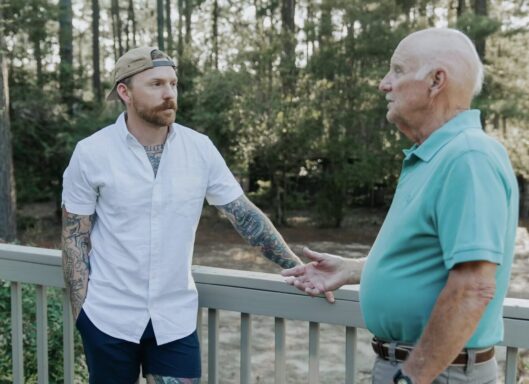
Reaching and Connecting Rural Veterans
OHRS provides rural veterans with an Interactive Map that helps connect them with other veterans close to their proximity to assist in building a sense of community. OHRS also hosts events to bring veterans together, with a focus on rural communities. Their most recent event was a two-day celebration filled with excitement, entertainment, and most importantly, support for the heroes who’ve served our country.
Check out their full list of resources: www.ohruralsalute.org/resources
Get Involved
Support should not depend on where someone resides. Nearly 25% of veterans live in rural America, and those veterans deserve access to basic healthcare and resources as much as the other 75%. While connection and raising awareness are key, donations and volunteering are just as helpful in making this group of veterans and their families feel supported.
This June, as we shine a light on rural veterans, we proudly stand with organizations like Operation Honor’s Rural Salute (OHRS), which provide vital support to these often-overlooked heroes every day. Amplifying the voices of rural veterans remains central to Mission Roll Call’s purpose, and partnerships with organizations like OHRS help bring that mission to life.
Learn more about OHRS and how you can support their work at www.ohruralsalute.org. To join us in advocating for rural veterans and ensuring their voices are heard, visit www.missionrollcall.org.
This June 21-22, Mission Roll Call is proud to join forces with the Lightning Warriors Hockey Program and the Malone Family Foundation for Hockey Heals 22, an inspiring event where 22 hours of continuous hockey are dedicated to one powerful mission: ending veteran suicide.
Veteran suicide is a national crisis. For years, the number “22” has served as a symbol, representing the estimated 22 veterans lost to suicide each day. While different studies and data sources have offered varied figures over time, the truth remains painfully clear: we are losing far too many heroes to invisible wounds.
Behind every number is a name, a family, and a story. And events like Hockey Heals 22 remind us that awareness alone isn’t enough—we need action, connection, and purpose to drive real change.
The Lightning Warriors
Founded in 2017 and formally incorporated in 2020, the Lightning Warriors Hockey Program is a Tampa-based 501(c)(3) nonprofit dedicated to serving the disabled veteran community through hockey. Their mission is to create a therapeutic and educational environment—both recreational and competitive—that fosters healing, camaraderie, and a renewed sense of purpose.
Hockey Heals 22 is an extension of that mission. It brings together athletes, veterans, and supporters to raise awareness, build community, and honor those we’ve lost by fighting for those still here.
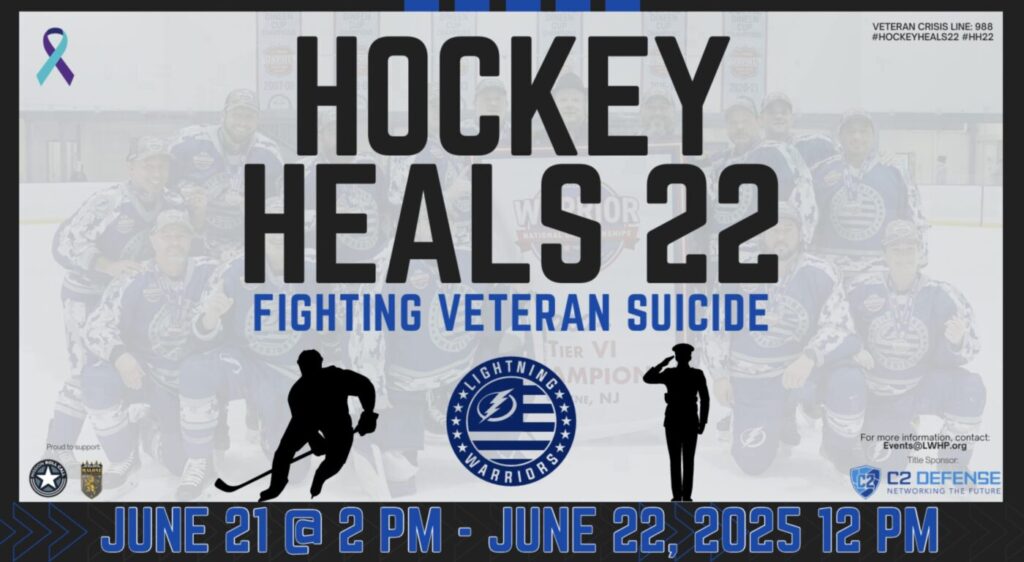
MRC’s Role
As a national, 501(c)(3) nonprofit, Mission Roll Call gives a voice to veterans and their families through real-time polling, storytelling, and advocacy. Our mission is simple: to ensure every veteran is seen, heard, and supported.
In 2025, we’re focused on four critical priorities:
- Suicide prevention
- Homelessness
- Access to healthcare
- Food and financial insecurity
These challenges are deeply interconnected. That’s why we listen directly to veterans, share their experiences, and advocate for smart, effective policies—like the Senator Elizabeth Dole 21st Century Veterans Healthcare and Benefits Improvement Act, which expands mental health care access and support for underserved communities.
Events like Hockey Heals 22 help bring our work to life, uniting national advocacy with local action and community care.
MRC is proud to share this space with the Malone Family Foundation, a fellow co-beneficiary whose mission centers on mental wellness and recovery for veterans, first responders, and their families. Their work—especially through sport-based wellness programs—echoes the values at the heart of this event.
If you’re in the Tampa area, we invite you to join us in person for Hockey Heals 22, as we stand alongside the Lightning Warriors, the Malone Family Foundation, and all those who are committed to saving lives and building a stronger future for our nation’s veterans and their families. If you can’t make it, follow along on MRC’s social channels for photos, stories, and updates from the event.
Together, we can help ensure that every veteran knows: you are not alone, and your life matters.
The wildfires came fast.
Fanned by dry winds and fed by brittle brush, the flames moved like a predator across Pacific Palisades. Smoke billowed through the canyons, blurring sightlines and choking the air. Residents scrambled to evacuate as emergency alerts pierced the quiet calm of the coastal neighborhood. For many, there was only enough time to grab what they could and flee.
Army veteran Jim Cragg stood his ground. He had a plan.
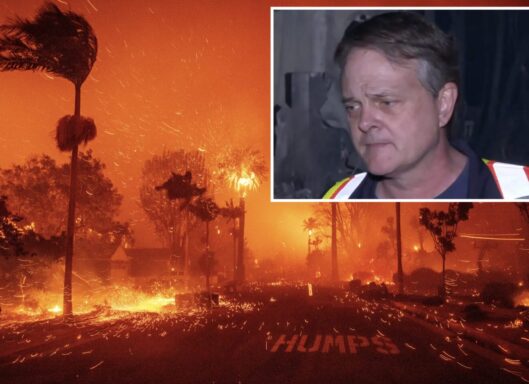
Years earlier, a brush fire had crept within 500 yards of his Pacific Palisades home while he was stationed at Fort Bragg. The close call was enough to change how he thought about fire readiness. “I decided when I got back, I would come up with a plan,” he said.
That plan was simple but strategic. He purchased multiple heavy-duty garden hoses, sprinklers, and a tube of fire retardant. When the flames approached this time, he was ready. “My wife came home, she took care of the animals and valuables. My job was to take care of the perimeter,” he explained. “I got on the roof and pulled those three sprinklers up, set them, and sprayed down the side of the house.”
Water arced over the home, soaking the roof and siding. The line it created stopped the fire in its tracks. From his vantage point, Jim could see the damage below—14 homes down the hillside, all lost. Two of them belonged to friends. “There was no guarantee it would work,” he said. “But it worked.”
A few blocks away, the American Legion Post 283 building also withstood the onslaught. Though smoke-stained and surrounded by scorched trees, the structure remained intact. Tattered but still waving, an American flag clung to its pole outside the Legion hall—partially burned at the edges but unbroken. It became a symbol in the days to come: of survival, of strength, and of what it means to rise after destruction.
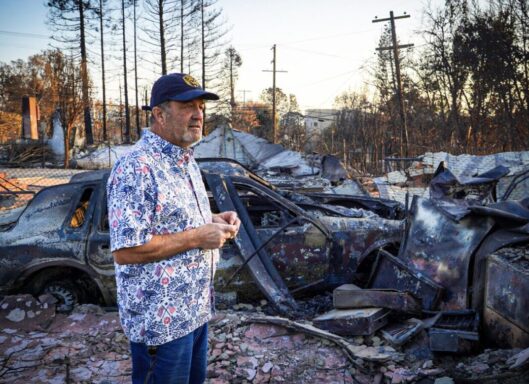
What happened next turned a moment of crisis into a mission of community.
Under Jim’s leadership, Post 283 quickly transformed into the Palisades Wildfires Community Support Center. Veterans rallied. They brought the same skills they’d learned in military training—logistics, coordination, calm under pressure—to the neighborhoods they had sworn to protect, even long after taking off the uniform. The Legion hall became a beacon amid the ash. It was a place to get supplies, ask questions, or simply find steady ground.
Jim, a Past Commander of the Post, mobilized volunteers. People knew they could count on the veterans. When disaster hits, you don’t want chaos—you want a chain of command. That’s what Post 283 offered.
This wasn’t the first time Jim answered the call. A longtime advocate for veterans and national security, he’s spent years working across both military and civilian sectors. But the fires made his mission personal. It went beyond protecting property. It was about stitching together a shaken community and showing that service doesn’t end with a DD-214.
That commitment soon caught national attention.
On June 2, Jim Cragg received a special award from Lieutenant General Scott A. Spellmon, Commanding General of the U.S. Army Corps of Engineers. The honor recognizes his leadership in promoting a combined Army-veteran response to the Pacific Palisades wildfires. The ceremony was held at the Legion Hall—the same place that served as a lifeline for the community and continues to do so today.
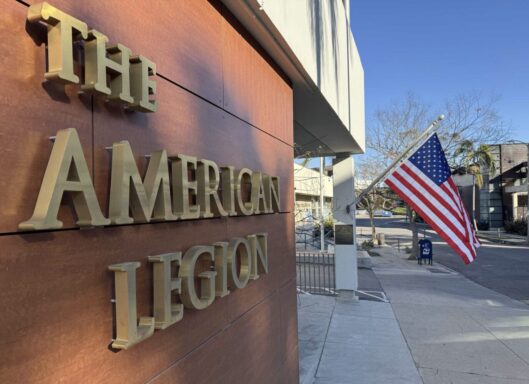
This summer, Post 283 has a full calendar of outreach and celebration that reflects its renewed purpose and commitment to the community:
- A special dinner for the National Guard and Army Corps of Engineers, with celebrity Chef Rush
- Participation in LA Fleet Week and the Military & Veterans Entertainment Awards
- Flag Day and Army 250th celebrations in June
- A powerful Fourth of July parade in the Palisades—one that will mean more this year than ever before. This year, the parade is more than a tradition; it’s a testament. A celebration not only of independence, but of resilience. Of how one community, led by its veterans, rose from the ashes together.
Today, that burned flag still flies outside Post 283.
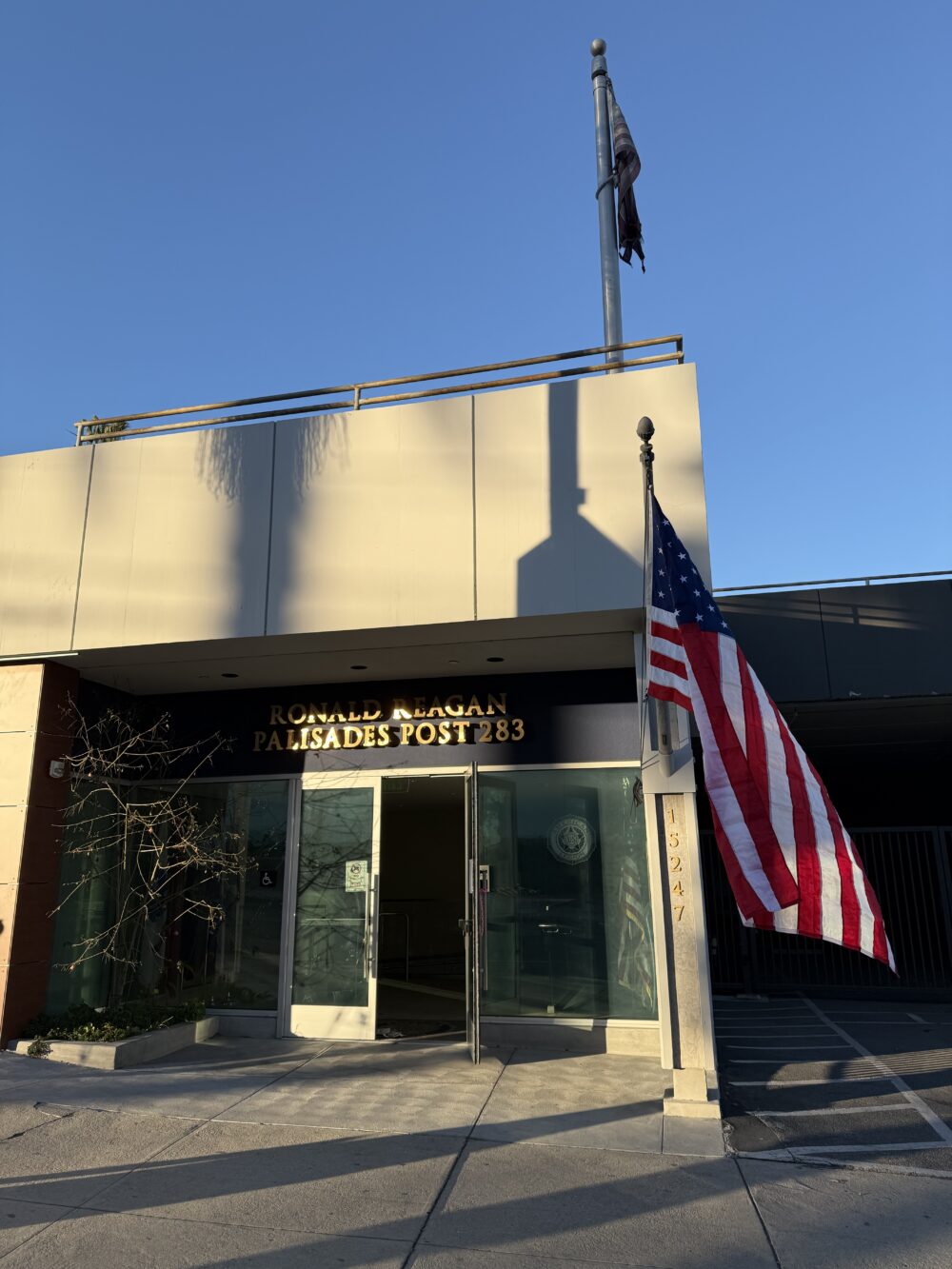
Its edges are curled, its colors dimmed—but it hasn’t been replaced. Not yet. Not because they can’t afford a new one, but because that flag tells the truth of what happened here. It survived. So did they.
Just like that flag, the veterans of Post 283 continue to stand tall as defenders of the country and as builders of community.
The fire may be out. But the mission has just begun.
May is a month rooted in reverence, honoring those who serve, those we’ve lost, and the invisible battles many veterans still fight every day. At Mission Roll Call, we used this month to spotlight both Military Appreciation Month and Mental Health Awareness Month, elevating the importance of recognition, resilience, and reform.
From celebrating the contributions of our service members to confronting the mental health crisis within the veteran community, May’s stories, interviews, and insights brought our mission into sharper focus.
Here’s what you might have missed:
Military Appreciation and Mental Health Awareness in Focus
We explored the true meaning of appreciation and support—not just in words, but in action.
– The Real Meaning of Military Appreciation
– Carrying the Mission of Memorial Day All Year
– From Waves to Wellness with Operation Surf
– 2025 Military Appreciation Month Discounts
Helpful Tips and Awareness
– Real ID and Veterans: What You Need to Know
– 5 Essential Financial Tips for Life After the Military
– The Military Fix-All That Held It All Together
The Lasting Mission Podcast
In May, The Lasting Mission podcast continued to elevate critical conversations that impact the veteran community.
This month’s episode features U.S. Representative Greg Landsman in part one of a two-part discussion on the opioid epidemic and how bipartisan action can lead to safer, non-opioid alternatives for pain management.
Listen to the episode
Subscribe to The Lasting Mission on YouTube or your favorite podcast platform, and help us spread these important conversations by sharing the podcast with others.
Mission Roll Call University (MRCU)
Our YouTube channel, Mission Roll Call University, continues to serve as a go-to resource for veterans, families, and supporters. This month, we released a new episode focused on managing finances and reducing stress before and after separation from military service.
– Break FREE from Financial Stress: Prepare for Your Military Transition NOW
Watch, subscribe, and share to help us ensure veterans have access to the guidance and tools they need to thrive.
MRC in the Media: Advocacy that Resonates
– Lawmakers Move to Stop VA from Quietly Taking Gun Rights from Veterans
– Veterans Concerned About Proposed VA Cuts
– VA Reform: Veteran Advocate Calls for Less Bureaucracy, Better Care
– Newsmax Interview with CEO Jim Whaley
– The Tony Kinnett Podcast – Daily Signal Interview
– Veterans group rises to Collins’s defense over VA cuts: ‘Gotta think differently’
Speak Up: Participate in Our Open Polls
Your voice shapes our mission. From VA services to veteran employment, our open polls help guide where we focus next.
Take the latest poll
Support the Mission: $25 for 250 Campaign
As we honor 250 years of military service, we’re asking supporters to give just $25 to power our next chapter. Every gift helps amplify the voices of veterans and their families.
Donate and explore the timeline
Looking Ahead: Rural and Minority Veterans, PTS Awareness, and Mental Health Resources
In June, we’ll shine a light on rural and minority veterans, communities often overlooked in national conversations, and honor Post-Traumatic Stress Awareness Month with practical resources, inspiring stories, and expert insights. From navigating VA enrollment to supporting mental health in everyday life, we’re committed to supporting veterans and families and bridging gaps in care.
Stay tuned for new research, new conversations, and new ways to get involved.
Memorial Day is a time of solemn remembrance—a day when we honor the brave men and women who have laid down their lives in service to our nation. It’s a day filled with ceremonies, the placing of flags on graves, and moments of silence and reflection. But for many, the weight of loss is not confined to a single day; it’s a daily reality.
At Mission Roll Call, we believe that while Memorial Day serves as a poignant reminder of the sacrifices made, our commitment to honoring those sacrifices must extend beyond just one day. It’s about ensuring that the legacy of our fallen heroes is upheld through continuous support and advocacy for those they left behind.
The Enduring Impact of Sacrifice
Behind every name etched on a memorial is a story—a family left grieving, a community impacted, and comrades who carry the memories of their fallen brothers and sisters. The pain of loss doesn’t dissipate after Memorial Day; it lingers, influencing the lives of Gold Star families and veterans alike.
Many organizations provide year-round support to families grieving the loss of a military loved one, offering counseling, peer support, and resources to navigate their grief. Their work underscores the importance of ongoing care and remembrance.
A Collective Responsibility
Honoring our fallen heroes is not solely the responsibility of their families or fellow service members; it’s a collective duty. As citizens, we must ensure that their sacrifices are not forgotten and that their families receive the support they need.
Participating in the National Moment of Remembrance at 3:00 p.m. local time on Memorial Day is one way to pay tribute. This nationwide pause encourages Americans to reflect on the sacrifices made for our freedoms.
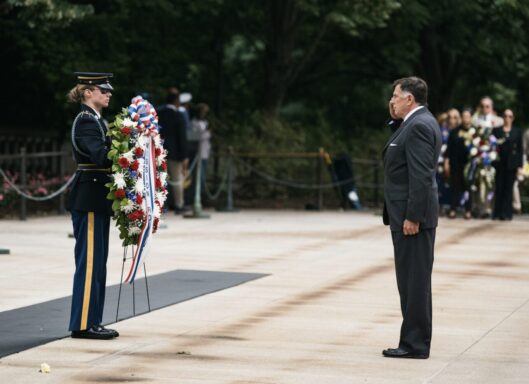
Year-Round Commitment
While Memorial Day is a designated time for remembrance, our commitment to supporting veterans and their families should be unwavering throughout the year. This includes:
- Advocating for policies that address the needs of veterans, such as mental health services, employment opportunities, and access to quality healthcare.
- Engaging with local communities to raise awareness about the challenges faced by veterans and their families.
- Supporting organizations that provide essential services to veterans and their families, ensuring they have the resources needed to thrive post-service.
Continuing the Mission
As we honor the memory of our fallen heroes this Memorial Day, let us also reaffirm our commitment to those who continue to bear the weight of their loss. By extending our support beyond a single day, we ensure that the sacrifices made are honored through action and sustained care.
Let us carry the mission forward—not just on Memorial Day, but every day. Join us at Mission Roll Call and share your voice.